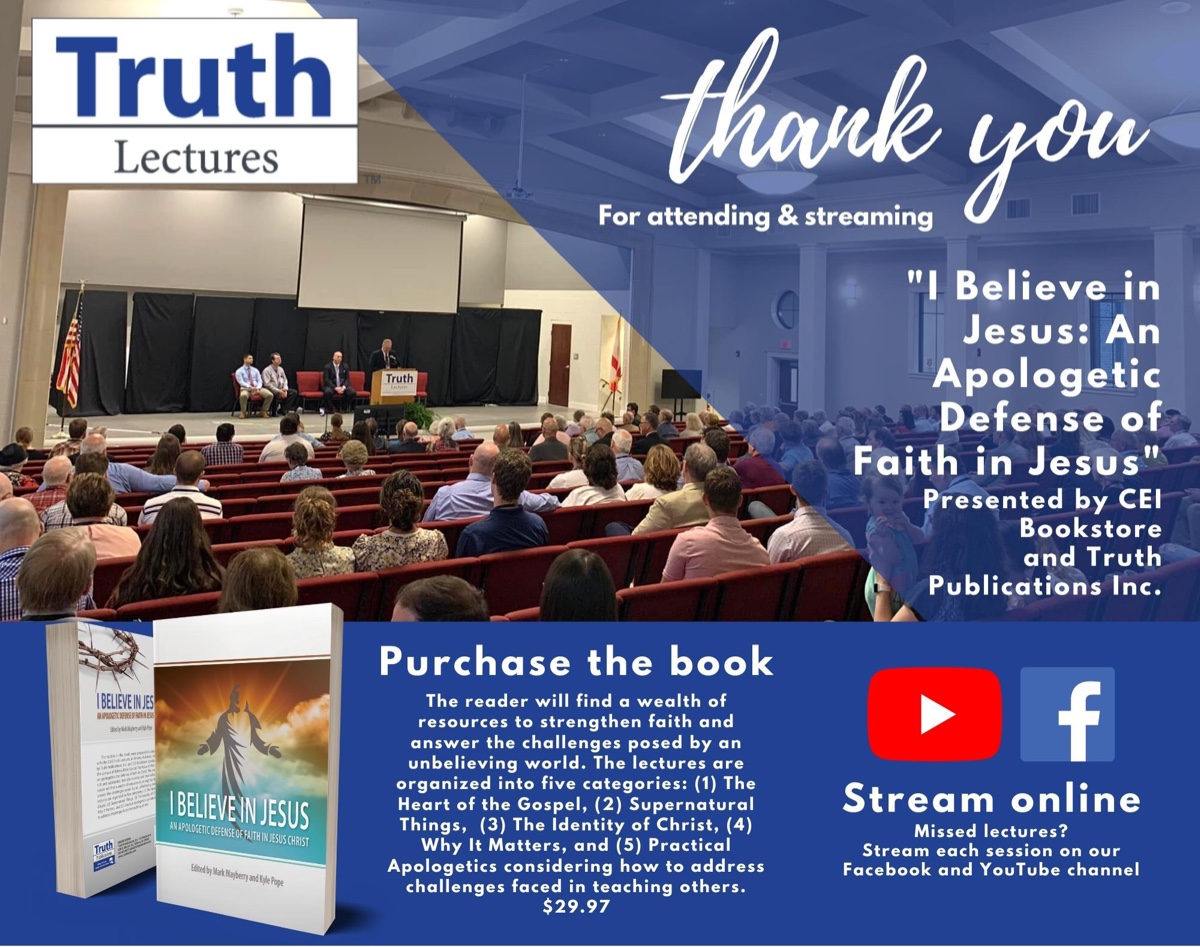By Bruce Reeves
Synopsis: Romans does not present a thin or superficial view of faith, but a thick and comprehensive approach to justification by faith.
The Bible’s great theme is that our eternally loving and divinely powerful God has provided salvation for all those who come to Him in submissive faith (Heb. 11:6). The principle of salvation by grace through faith, as stated by Paul in Ephesians 2:8, is observed both in the OT and NT. The specific conditions required for Noah, Abraham, Moses, or alien sinners today differ, but the truth that we are saved by grace through faith remains constant (Heb. 11:7-31).
Unfortunately, the heart of the gospel has been clouded and distorted by the erroneous interpretations of men. Reformed Theology’s unbiblical definitions of New Testament terms must be corrected, and the gospel as presented, defined, and explained by inspired writers should be accepted without hesitation. It is not uncommon for some to allow Calvinistic scholars, speakers, and writers to guide their thinking, concepts, and teaching, and then falsely accuse faithful brethren of not believing in grace. Ironically, such presumptive individuals are the ones who have distorted the biblical principles of salvation.
In this study, we will consider key terms and concepts that will help us appreciate the use of various terms which are central to the message of the cross. False teaching frequently redefines biblical terms in an unscriptural manner. Yet, by considering how the words are being used by inspired writers, we bring the clarity and focus of the gospel of Christ to the forefront of the discussion.
The NT usage of the term “grace” is multifaceted. The concept of grace is seen in the love of God and Christ, salvation, spiritual gifting, divine strength, benevolence for needy saints, sacrificial concern for others, and even apostolic greetings (Rom. 12:6; 16:20; Eph. 2:5; 1 Cor. 12-14; 2 Cor. 8-9; 1 Pet. 4:10). If it were not for the grace of God, we would remain in a hopeless and lost condition because of our sin (1 Cor. 15:10; Eph. 2:1-8, 12-13). In this article, we focus on divine grace as it relates to our salvation. Some misunderstand the fullness of God’s grace in redemption by equating conditions with merit. These concepts are not equivalent and must be distinguished to appreciate the message of Christ. The danger of this type of confusion cannot be overstated.
The term grace has been rightly defined as the “favor of God.” We do not deserve salvation, nor can we merit or earn a righteous standing before God, but this does not deny the conditions of faith in receiving the forgiveness of Christ (Rom. 3:23-26; Titus 3:3-5). We tend to import our own modern-day notions into the concept of grace, whereas the first century perspective of the gift of grace was never understood to be void of reciprocity (Barclay, Paul and the Gift, 20-32). Those who argue that grace removes any expectation of action on the part of the sinner have a foundational misunderstanding of what it means to live for God and how the term was used in biblical times. While we have all fallen short of God’s glory (Rom. 3:23) and desperately need the Lord’s cleansing through the death of His Son (Rom. 5:6-8; 1 John 1:7-9), let us recognize that the working of God’s good pleasure calls us to “work out our own salvation with fear and trembling” (Phil. 2:12-13). Although the provisions of God’s grace are freely and openly offered to all, the reception of that grace is conditioned on obedience to the gospel.
The grace of God does not leave us enslaved to sin, but frees us from spiritual bondage. Paul writes, “What shall we say then? Are we to continue in sin so that grace may increase? May it never be! How shall we who died to sin still live in it?” (Rom. 6:1-2). While we all falter from time to time and must rely on the grace of Christ, the notion that the faithful Christian is in a “wretched” condition of spiritual defeat and should simply give up fighting the good fight is found nowhere in the good news of Jesus (Eph. 6:10-17).
The Spirit’s gospel has set us free from the ruling principle of sin and death (Rom. 8:1-2). We are not set free to continue in sin, but to live out the purpose of Christ: “So then brethren, we are under obligation, not to the flesh, to live according to the flesh—for if you are living according to the flesh, you must die; but if by the Spirit you are putting to death the deeds of the body, you will live” (Rom. 8:12-13). The apostle appeals to our baptism into Christ as a reference point for our spiritual transformation. When we by faith surrender to the Lord in baptism, the old self of sin is crucified (i.e., put to death), and raised to walk in newness of life. Jesus died, was buried, and arose so that we would no longer be slaves of sin (Rom. 6:3-13; cf. Col. 3:1-2). Paul describes conversion from the world of sin to life in Christ with words such as “master,” “reign,” “death,” “alive,” etc. He proclaims God’s transforming mercy:
What then? Shall we sin because we are not under law but under grace? May it never be! Do you not know that when you present yourselves to someone as slaves for obedience, you are slaves of the one whom you obey, either of sin resulting in death, or of obedience resulting in righteousness? But thanks be to God that though you were slaves of sin, you became obedient from the heart to that form of teaching to which you were committed, and having been freed from sin, you became slaves of righteousness (Rom. 6:14-17).
As a result of “the mercies of God,” you are encouraged “to present your bodies a living and holy sacrifice, acceptable to God which is your spiritual service of worship. And do not be conformed to this world but be transformed by the renewing of your mind. . .” (Rom. 12:1-2). The Lord’s mercy reshapes our mind and heart from the inside out. The purpose of the grace of God is not to leave us conformed to the world, but to transform us into the image of Christ (Eph. 4:22-24). Through the New Covenant we “are being transformed into His image with ever-increasing glory, which comes from the Lord. . .” (2 Cor. 3:18). Grace leads to justification, renewal, and the restoration of Christ!
For the grace of God has appeared, bring salvation to all men, instructing us to deny ungodliness and worldly desires and to live sensibly, righteously and godly in this present age, looking for the blessed hope and the appearing of the glory of our great God and Savior, Christ Jesus, who gave Himself for us to redeem us from every lawless deed, and to purify for Himself a people for His own possession, zealous for good deeds. These things speak and exhort and reprove with all authority. Let no one disregard you (Titus 2:11-15).
God’s grace includes His instructions, teachings, and commands. Many have the notion that exhortation to holiness and encouragement to godliness undermine the grace and mercy of Christ, but the opposite is true. The Lord’s grace calls us to redemption and purification from sin in zeal for good deeds. God has disclosed His divine will, offered His merciful encouragement, and revealed His holy commands because He loves us. These things are to be graciously, boldly, and authoritatively spoken. If we have accepted a view of grace that precludes what Paul wrote to Titus, then it is not the grace of God that we are preaching and proclaiming.
The Scriptures warn us of those who would abuse or twist the grace of God into license to sin. While just about everyone will deny that their teaching does so, the logical consequences of popular doctrines often lead to this end. As noted earlier, Paul defends the purity of God’s grace by denying that it permits one to continue to live in sin (Rom. 6:1-2). Peter exhorts believers to stand firm in the “true grace of God” (1 Pet. 5:12) and to “grow in the grace and knowledge of our Lord and Savior Jesus Christ” (2 Pet. 3:18). Jude demonstrates that God’s grace encourages us to “contend earnestly for the faith which was once for all handed down to the saints” (Jude 3). It is disconcerting when brethren begin to present a view of grace that dilutes, ridicules, and mocks fundamental principles of biblical authority in doctrinal and moral issues. Jude warns: “For certain persons have crept in unnoticed, those who were long beforehand marked out for this condemnation, ungodly persons who turn the grace of our God into licentiousness, and deny our only Master and Lord, Jesus Christ” (Jude 4). We are “partakers of grace” in the “defense and confirmation of the gospel” (Phil. 1:7). Thank God for the richness of His grace!
There is perhaps no topic that has generated more theological debate than this one. Like the question of the meaning of grace, the issues surrounding the role of faith and works in salvation demand that biblical terms be defined in harmony with the context of Scripture. This is another case in which even some of our brethren have accepted the Calvinistic dictionary, rather than the biblical usage of “faith” and “works” regarding salvation. If one defines saving faith as a “non-doing trust” rather than loyal faithfulness and steadfast allegiance to Jesus Christ as Savior and king, then there are doctrinal consequences that have a ripple effect throughout their entire belief system. This may happen slowly or quickly, but do not be deceived, it inevitably occurs. When it does, it will affect struggling disciples, ungrounded elderships, and vulnerable or untaught congregations. Sadly, history displays the painful reality of this cycle time after time. Lord willing, we will be alert, aware, and diligent.
Faith does not refuse to assess evidence, nor is it a leap in the dark; rather, it is produced through “reasoning. . . from the Scriptures” which persuades us that Jesus is the Christ (Acts 17:2-4; 18:4; 19:8-9; Rom. 10:17). Neither is faith reducible to mere mental assent, for the demons “believe and tremble” (Jas. 2:19). Saving faith is not inactive, disobedient, or non-expressive (John 12:42; Jas. 2:14-18).
The question before us is, “How is Paul using the term”faith” in the book of Romans?” Calvinists argue that he is using it to refer merely to trust, i.e., faith alone with no further acts of obedience. In fact, Classic Calvinists deny faith itself is an act of obedience (John 6:28-29), but argue that it is an irresistible gift (Note #1). Those who have defined “faith” as “faith only” and “works” as “anything you do” are not defining these terms as Paul did in his writings. Romans does not present a thin or superficial view of faith, but a thick and comprehensive approach to justification by faith. The bookends of Paul’s letter to the Romans show the theme of the entire epistle: “. . .through whom we have received grace and apostleship to bring about the obedience of faith among all the Gentiles for His name’s sake” (Rom. 1:5), and then again, “But now is manifested, and by the Scriptures of the prophets. . . has been made known to all the nations, leading to the obedience of faith” (Rom. 16:26). Faith is the total response of obedience to the gospel. It is also a death and resurrection experience which certainly eliminates any notions of shallow belief without the transformation of our lives (Gal. 2:20). The interpretation of faith is not about merit, or “salvation by works,” but about what constitutes participation and fellowship in Christ (Gal. 5:6, 13-14; Phil. 3:9-10; 2 Pet. 1:4).
There has been much discussion and misunderstanding regarding whether Paul and James contradict or harmonize in their writings. Anyone who believes in the inspiration of the Bible recognizes they do not contradict, but how can these texts be explained? Paul argues that Abraham was not justified by works (Rom. 4:3), but James argues that he was justified by works (Jas. 2:21-23). Some attempt to reconcile the issue by asserting that Paul is speaking of alien sinners, while James is only speaking of children of God. However, there are some major problems with this line of thinking. At the very beginning, it should be noted that James introduces us to the faith of Abraham, who at the time was a child of God, but also to the faith of Rahab, who was an alien sinner who showed a working faith. The nature of saving faith is the same whether one is obeying the gospel or continuing to walk with Christ—it is obedient. Both writers explain the nature of a saving faith and reference Genesis 15:6, but they are using “works” in two distinct senses. If we understand this truth, then we can see that Paul and James are in perfect harmony.
Paul is contrasting two systems of justification, i.e., the law of works and the law of faith (Rom. 3:27). He then drops the phrase “law of” and just uses the terms “faith” and “works.” The “law of works” primarily refers to the Law of Moses, but would apply to any system of justification outside of the gospel of Christ. It would require perfect performance and, since we are all sinners, would offer us no hope (Gal. 3:10-12, 14, 26-29). In Romans, the “works” that are not saving are associated with “wages” and what is “due” (Rom. 4:4). When Paul says, “But to the one who does not work,” he does not mean “to the one who does not obey,” but rather “to the one who is not sinless.” Righteousness before God would not be based on one’s Jewishness, but one’s faith in Jesus Christ (Rom. 2:28-29; 5:1-2). Note that in the context, he says that God “credits righteousness apart from works,” but a couple of chapters later, he says we “obey unto righteousness” (Rom. 6:16). Therefore, the works that do not save are not works of obedience to Christ. Baptism is never associated with “the law of works” by Paul, but with faith (Rom. 6:3-4; Gal. 3:26-27). It is even related to the “working of God” and the “resurrection of Christ” (Col. 2:11-13; 1 Pet. 3:21). Those who define works as “anything you do” lack understanding of Paul’s teaching. We can only be saved through the forgiveness of Christ by an obedient faith (Rom. 4:6-8; 6:16-18). James is not using the term “works” to refer to a system of justification, as is Paul, but to the activity of faith. He only separates faith and works to illustrate that an inactive faith is dead and vain: “You see that a man is justified by works and not by faith alone” (Jas. 2:24). James is emphasizing the nature of a saving faith just as Paul is emphasizing “the obedience of faith” (Rom. 1:5:16:26).
The New Testament’s citation of Genesis 15:6 is significant. The attempt to interpret this quotation as “faith only” or a “non-doing trust” is, at best, reckless and irresponsible and, at worst, deliberately disingenuous. It is emphasized that Abraham was justified through God’s forgiveness by faith before he was circumcised in Genesis 17 (Rom. 4:9-12). As a result, Abraham is the father of faith to the circumcised and uncircumcised, to the Jew and to the Gentile who believes in Christ. Genesis 15:6 was not a description of a one-time event in Abraham’s life, but it was a general statement of Abraham living in faithfulness to God. It is applied to Abraham when he began his walk of faith when he left Ur (Gen. 11:28-12:3; Gal. 3:6-8). Later, Genesis 15:6 was applied to him when he trusted the Lord’s assurance of His promises (Gen. 15:1-6), again when he and Sarah trusted the Lord for the birth of Isaac (Rom. 4:22), and then when he was willing to offer Isaac (Gen. 22; cf. Heb. 11:17-19; Jas. 2:21-23). James emphasizes the truth that the statement made about Abraham’s faith in Genesis 15:6 was fulfilled when he demonstrated obedience to God in Genesis 22. Let us recognize that God’s declaration of Abraham’s faith was not a single moment in time, but it was a description of his journey of faith. The faith that saves is a surrendering, active, living, obedient trust in God (Heb. 11:6). The biblical dynamic of faith is a life-changing resurrection and transformation. Let us walk by faith and not by sight (2 Cor. 5:7). We are saved by a grace that we do not deserve and a faith that fully surrenders to Jesus as our Savior and king.
May God help us see the power, beauty, and majesty of the salvation of our Lord Jesus Christ.
Barclay, John M.G. Paul & the Gift. Grand Rapids, MI: Wm. B. Eerdmans Publishing Co., 2017.




